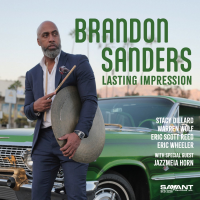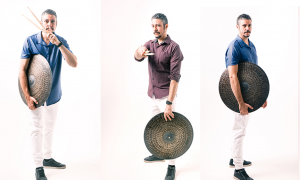Home » Jazz Articles » Interview » A Fireside Chat With Bill Cunliffe
A Fireside Chat With Bill Cunliffe
Singers are as much a visual experience as they are an auditory experience. I think that is why vocals are popular now.
 There is a tendency to be indifferent to the familiar -an absence of appreciation with an assumption of the routine. But there is a wisdom in nothing lasts forever. So perhaps, it would behoove us to be grateful that we have musicians locally like Bill Cunliffe (unedited and in his own words), who too yearns for a renewed sense of community. With harmonic and lyrical sensibilities rivaling certified headliners in celebrated New York, Cunliffe has certainly honored Los Angeles with his loyalty to the belief that jazz in Los Angeles can one day be a palace again.
There is a tendency to be indifferent to the familiar -an absence of appreciation with an assumption of the routine. But there is a wisdom in nothing lasts forever. So perhaps, it would behoove us to be grateful that we have musicians locally like Bill Cunliffe (unedited and in his own words), who too yearns for a renewed sense of community. With harmonic and lyrical sensibilities rivaling certified headliners in celebrated New York, Cunliffe has certainly honored Los Angeles with his loyalty to the belief that jazz in Los Angeles can one day be a palace again. All About Jazz: Let's start from the beginning.
Bill Cunliffe: My mother was a good pianist and she had a piano at home. My dad played the phonograph all the time. So there was music in the house all the time. I started just copying little things that I would hear my mom play and I would sit next to her and listen. I was very fascinated with it. When I was in school, I was thinking about other types of careers. I was pre-med for a few months. I was a psych major for two years. It wasn't until junior year of college that I finally said that music was it and I wasn't going to do anything else.
AAJ: Listening pleasures?
BC: When I was a kid, I was listening mostly to classical music because my dad had a lot of it in the house. I listened to all the stuff that was on the radio in the Sixties and Seventies. The stuff I liked was really the jazz oriented stuff. I loved Burt Bacharach. I loved Sergio Mendes. I loved anything with hip harmony in it. I've always been drawn to great harmony and secondarily to great melody, not so much rock and roll, although I liked rock and roll. I didn't hate it, but it didn't really interest me as much as the piano oriented music. Herb Alpert, I really liked his music. The 5th Dimension, their harmonic concept. I loved the black vocal groups that got into hipper harmony and interesting songs.
AAJ: What is the difference between harmony and melody?
BC: Melody is kind of the top part of the harmonic chord. In other words, what you sing when you are walking along the street, that's the melody. That's the part that you heard that is usually sung by the singer or played by the instrumentalist. The harmony is kind of the background. There's two types of background. There's rhythmic background and there's harmonic background. Rhythmic background is what the drums are playing primarily. And harmonic background in jazz music is primarily what the pianist is playing. Although, what the pianist is playing is both harmonic and melodic. That's a great question. I've never had anyone ask me that and it's a great question to present to people because we just assume that everyone knows what harmony and melody is, but melody is the top part and harmony is the part underneath.
AAJ: One of your most refreshing recordings is for a classical label, Naxos, Bill Plays Bud.
BC: And at one point, they were the largest classical label in the world, in terms of the amount of titles they had. The first thing is, Bud Powell is the most important pianist in jazz and one of the most underrated because he spent over a third of his life in mental and medical hospitals. He was beaten by the police when he was twenty and he never fully recovered from that beating and as a result, he suffered pain and had to take drugs to alleviate the pain. So he never fully recovered from that and in spite of that, he created a whole lot of wonderful music. He was really the first guy, before Bud Powell, pianists were playing boom, chuck in the left hand and a lot of melodic figures in the right hand that tended to be arpeggios. But with Bud Powell, Bud Powell was imitating Charlie Parker. So Bud was the first pianist to take Charlie Parker's language and adapt it successfully to the piano. That's why he is the most important pianist in music today because everybody plays like that now.
AAJ: And Live at Rocco featuring Joe La Barbera, characteristic of many of your sophisticated ensembles.
BC: Yeah, there are many things I love about Joe, but philosophically, he is a traditionalist. He's very, very open to anything that is innovative and stretches the tradition. So in that way, when he worked with Bill Evans, he was able to swing very, very hard in a conventional bebop setting, yet he was able to work with Bill and Bill's ideas were very creative and avant-garde within the tradition. Joe was able to adapt to that and I feel that Joe was able to give me a traditional rhythmic approach, which I sometimes really love and then other times, he is able to be very avant-garde rhythmically, not play rhythms, maybe play colors, lose the time, get it back, and be very innovative. In the sextet, that is really important because there are times in the band that we will actually play free for a little while. We won't have any tempo or any format. We're playing songs, but sometimes we stop playing the songs all together and just play whatever we want. Joe has the maturity to do both of those things and know to splice them together. There are many great musicians that when they play free, they don't know how to get out of it and back to the music. Joe is very orchestrational. He knows how long things should be. A drummer needs to be an orchestrator. If he sees that I'm going somewhere, he needs, not only to go with me, but he needs to make it feel like the music is designed that way. That is what Joe does so well. I do projects producing singers and I always use Joe because he will give me absolutely, the basic, perfect sound that I want for anything that I want to do.
AAJ: Your latest recording, How My Heart Sings is comprised of the compositions of Earl Zindars.
BC: The idea came from the head of Torii Records. I knew a few things. I knew "How My Heart Sings," "Mother of Earl," and "Elsa." I had played "Elsa" a lot. I love that tune. Earl sent me fifty or sixty tunes. There was an awful lot there that was interesting to work with. He was an interesting composer in that he was one of the first, along with Brubeck, to write songs where the time signature changes. For example, on "How My Heart Sings," the first part of the song is in a waltz feel, but the middle part of the tune is in a 4/4, medium, swing jazz feel. That was very, very innovative for the Fifties. Very few guys were doing that. His music is very interesting harmonically as well and he has a really strong melodic sense. He's a very good composer.
AAJ: Producing vocalists, are singers benefiting from the respect that comes with sales?
BC: I think the pendulum swings. I think that good singers were underrated for a while and then I think we're in it right now, where vocalists are getting a whole lot of attention. In fact, there was an article in a magazine saying if vocalists saved jazz and all my friends were saying that vocalists killed jazz. I think that vocals are getting attention because modern people like to look at things. They like to look at something rather than just listen. I think that is kind of a shame. When I was a kid, we would sit on the sofa and put records on the phonograph and sit and listen to them. We don't do it now because we're all really busy and I think it is a visual era. Singers are as much a visual experience as they are an auditory experience. I think that is why vocals are popular now. The standard tune as really established itself once again. I just heard Rod Stewart singing a standard in a Starbucks the other day. They are all doing standards albums, which I think is a great thing. I'm really happy about that.
AAJ: What is the state of jazz in Los Angeles?
BC: It's not very good, except for everywhere else. Given all that we have, it's not bad. There's radio support for it. There are clubs. There's not that many clubs, but there are a few really good places to play here. I've spent a lot of time in New York and it is getting rough back there. The super high real estate has eliminated a lot of clubs. San Francisco has this really intense interest in jazz, but there is nowhere to play there. L.A., because it is spread out and real estate isn't quite as expensive, there are all these little joints. Everyone I know is working and I think that is really great. In that way, L.A. is fairly strong. What L.A. isn't strong at is guys getting together. It is geographically far apart and there is not as much interaction and synergy as I would like. It is a mixed report. We have good jazz radio here. We have a great talent pool here. We have a few good places to play. We don't have the collaborative nature we should.
AAJ: And the future?
BC: In February, I am recording an album of salsa/Latin based music. I am using Ramon Banda and Papo Rodriguez, and some of regular guys in my band, Bobby Shew, Bob Sheppard. I am working on that. I am working right now on a commission for the Eastman School of Music. I am writing a jazz version of the Prokofiev Concerto for Piano no. 3 for big band and piano. I've loved this piece since I was a kid. It really works well in jazz. It is really a jazzy piece anyway. I just finished a DVD of beginning jazz and blues piano. I will be playing at the Jazz Bakery with a singer names Melissa Sweeney. I produced her first album. She is a really good singer.
Tags
PREVIOUS / NEXT
Support All About Jazz
 All About Jazz has been a pillar of jazz since 1995, championing it as an art form and, more importantly, supporting the musicians who make it. Our enduring commitment has made "AAJ" one of the most culturally important websites of its kind, read by hundreds of thousands of fans, musicians and industry figures every month.
All About Jazz has been a pillar of jazz since 1995, championing it as an art form and, more importantly, supporting the musicians who make it. Our enduring commitment has made "AAJ" one of the most culturally important websites of its kind, read by hundreds of thousands of fans, musicians and industry figures every month.
























